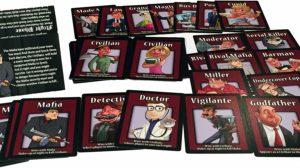For this critical play, I played and will be discussing Mafia, which is a social deception game. Our team’s game also revolves around the theme of social deception and models a conflict between two groups: the murderer and the murderer’s assistant (in Mafia, the mafia) versus the townspeople (with identities).
Mafia is a classic social deception game with mechanics that I believe most strongly align with the “fellowship” type of fun. The moderator assigns roles to players, and the game then consists of two types of phases, night and day. In the night phase, players with abilities (including killing, saving, seeing, etc.) execute their actions secretly, and in the day phase, townspeople learn of the results of the executed actions and may discuss and debate their suspicions; at the end of this phase, they vote to eliminate a player. The game continues until either the townspeople or the mafia eliminate the other group or reach numerical parity.
At the game’s root, there are two teams playing against each other (team competition), yet the townspeople do not know who their fellow team members are in the group. This is where a lot of the fun, in my opinion, comes from. The mafia must employ tactics to convince everyone that they are not mafia, and the townspeople must actively judge whether to trust or suspect the other players. Good mafia players can successfully convince others that they are trustworthy, and innocent townspeople could be cast as suspicious. All of these interactions occur during the day phase. This discussion also allows for a little bit of the “narrative” type of fun to live its potential, as players can craft narratives to help paint their own stories and others’ stories as well. However, because all the discussion is entirely freeform and open, this can lend way to abuse during the game. Players who are overly accusatory can make others feel uncomfortable, players can incite overly aggressive conversations and discourse, and general toxic behavior can be present. Perhaps it is the onus of the moderator to handle these potential instances of abuse, or just the group to handle them themselves, but I don’t believe there is an explicit handling of abuse by the game itself. Regardless, these dynamics, then, are challenging and tricky and make the theme of social deception shine, thereby allowing Mafia to be a complex game that players must practice and strategize in order to master.
With my friends, I often play Mafia without any materials, though we do occasionally use an online version. There are also many similar games. Werewolf is almost identical, and One Night Werewolf is similar but only consists of one round. Personally, I think multi-round Mafia is more enjoyable and satisfying as a game because as a player, you get to use multiple rounds and new information that you receive during each round to help you master the challenging social deception dynamics as described above. However, there are indeed some aspects of the game, which are also shared by the similar games, that could be improved upon. When playing, I noticed that the game tends to be more enjoyable if I had a significant or at least interesting role. Perhaps roles could be more balanced in terms of capability, as some roles, including townspeople, are essentially unable to do anything during the game except observe and discuss. Furthermore, when playing without an online system and thus distributing roles on our volition, we sometimes observed that the game ended up being quick (i.e. it was too easy for the townspeople to win over the mafia). Perhaps there could be more constraints regarding what set or distribution of roles must be present with a given number of players.



